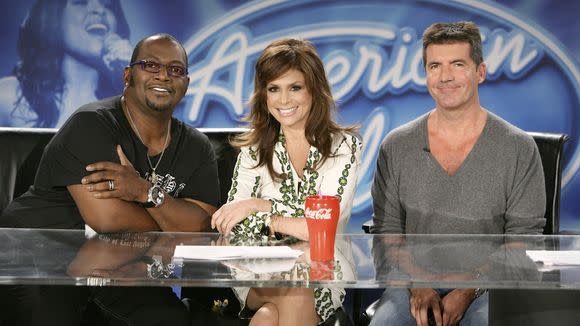A Happy Farewell to 'American Idol'

American Idol premiered in June of 2002, which means I’ve been waiting almost 14 years to write these two words: Good riddance. The final, two-hour show this evening will crown a winner who, if recent seasons are any indication, will make absolutely no impact on music of the future, and viewers can cry mock-tears at the show’s mock-heroes, since you can bet novelty candidates like William Hung and discarded original co-host Brian Dunkleman will probably be trotted out for final humiliations. This long national nightmare cannot end too soon.
Related: ‘American Idol’: Judging the Judges
Let me make my position clear: American Idol warped millions of our citizens’ minds about the definition of what a “good” pop singer is. The standards Idol promoted included singing as close to perfect pitch as possible, and belting out a melody with florid emotionalism and deploying melisma with absurd exaggeration. According to the aesthetic theory advanced by Idol, the greatest singers who ever lived are Whitney Houston and Celine Dion. By Idol standards, Little Richard, Bob Dylan, Joni Mitchell, Chuck D. of Public Enemy, Nirvana’s Kurt Cobain, and Kanye West — to take just a random sampling of original artists through the decades — would never have made it past their first open auditions because they don’t sing “properly.” (This assumes, of course, the absurd proposition that any one of these artists would ever entertain the notion of appearing on a cheesy enterprise like Idol in the first place.)
When it began in 2002, I was briefly taken with the idea that British judge Simon Cowell was doing the Lord’s work in introducing many Americans to a novel concept called “criticism.” In my review of the show’s first season, I wrote that Cowell’s crisp, catty critiques have “made it safe to say something uncomplimentary about another’s talent without a thousand voices whining about the ‘cruelty’ of being ‘mean.’” I suggested that “the irony of this entire cynical enterprise called American Idol may be that it has retaught this country the value and virtue of criticism.” My greatest hope for the show was that this British import would toughen up Americans, their emotions soft and tingly-sensitive from lifetimes of soothing, Oprah-fied, coddling “constructive” criticism.
Related: ‘American Idol’ Take Us Behind the Scenes (Photos)
Alas, I was wrong. On the self-congratulatory American Idol: American Dream special that aired on Tuesday, a new interview with first-generation judge Paula Abdul — whose efforts I once described as “attempts to form a single sentence with both a subject and a predicate” — said she couldn’t believe how harsh Cowell was, since he said things to contestants’ faces that “Americans would only say behind your back,” and she meant that last part as a good thing.
The heroic version of Idol history is that it wrested control over the star-making machinery from the big, bad music industry and handed it over to the democracy of the viewing, voting audience. But this was always a sham. Cowell’s comments were designed to winnow down the contestants and influence home-voters to yield a winner who’d be groomed for hit-single stardom by a music organization of which Simon Cowell was one of the profiteers. In other words, Cowell was always just a music executive in a black muscle shirt instead of a business suit, trying to gauge the crassest mass taste of the moment.
To be sure, given as many thousands of hours of television Idol did, it was inevitable that some quality would seep in. I’ve always loved Kelly Clarkson as a singer and performer; I thought Adam Lambert was both a solid talent and, for a time, an important pop-culture figure. Carrie Underwood’s had a few good hits. Kellie Pickler is the best country singer the show yielded. Jennifer Hudson deserved her Oscar. I liked the way a contestant such as Tamyra Gray could make ”And I Am Telling You I’m Not Going” sound more like a threat than a manifesto.
But the rest of it? Dreadful schlock, camp, and manipulation. I particularly loathed the annual opening rounds of auditions, in which producers hand-picked awful singers so that they could howl and yammer in front of the judges, who then responded with supposedly spontaneous eye-rolling, head-to-table moaning, and “funny” sarcasm. The falseness of all of this was depressing and boring.
Think of all the “idols” that Idol created — the vast majority of them have vanished. (The cries of “Soul Patrol!” echo through the memory of very few people except Taylor Hicks’s.) On Wednesday, I had CNN news on mute when up popped a semi-familiar image: Clay Aiken, former leader of the progressive Claymates party, now wearing horn-rimmed glasses and, according to the type running beneath his image, currently an active supporter of Bernie Sanders. I never turned up the volume to hear what Aiken had to say. I couldn’t bear to hear another American Idol voice, even one just talking, again.
American Idol airs its series finale Thursday night at 8 p.m. on Fox.

